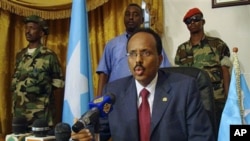With the mandate of Somalia’s Transitional Federal Government due to expire in August, Somali Prime Minister Mohammed Abdullahi Mohammed was in Nairobi Thursday to discuss regional security with his Kenyan counterpart, Prime Minister Raila Odinga.
Over the 20 years of Somalia’s instability, Kenya has frequently felt the effects of its neighbor’s numerous wars. According to the U.N. refugee agency, nearly 400,000 refugees were living in Kenya as of January, a population expected to grow to over half of a million by the end of 2011. And these figures do not include the thousands of Somalis who fled their country to become permanent residents in Kenya.
Kenya has also been drawn in to Somalia’s actual conflict. In February, Somali government forces launched an offensive to oust al-Shabab insurgents from southern Somalia. With intense fighting along the borders to control critical entry points into Somalia, violence spilled into the northern Kenyan town of Mandera, claiming the lives of civilians and forcing a buildup of Kenyan troops.
Prime Minister Mohammed told reporters in Nairobi that Kenya’s support was a key component of TFG military operations in the Gedo and Dobley regions of southern Somalia, where much of the fighting has taken place. Mr. Mohammed warned of the threat posed by al-Shabab’s foreign fighters from countries such as Afghanistan and Pakistan, who seek to destabilize the region as a whole.
The talks between Mr. Odinga and Mr. Mohammed come ahead of a United Nations-sponsored conference next week in Nairobi to discuss the transition of the interim Somali government in August. The meeting has garnered criticism from Somali leaders who argue transition talks would damage the progress of recent months.
Prime Minister Mohammed called for any such discussions to take place in Somalia. He also recently criticized the United Nations for basing its Somalia programs in Kenya. On Tuesday, the prime minister ordered all U.N. agencies working in Somalia to permanently relocate to Mogadishu within six months. The U.N. maintains only a few permanent personnel in Somalia because of security reasons, with the rest of its Somali-focused staff based in Nairobi.
After the meeting with the Kenyan Prime Minister, Mr. Mohammed told reporters the two agreed to work together to defeat any enemies of peace and progress in Somalia.
Somalia has not had a functioning central government since dictator Mohammed Siad Barre was overthrown by warlords in 1991. Al-Qaida-linked al-Shabab has been battling the transitional administration since 2007 and controls the majority of southern Somalia, including parts of the capital, Mogadishu.




